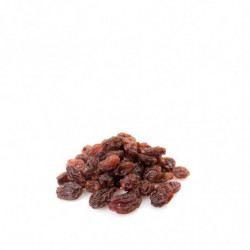



Sultana raisins are sweet little gems that you can't resist. With their golden color and soft, juicy texture, sultana raisins are the perfect snack to satisfy your cravings in a healthy way. These dried grapes are known for their naturally sweet flavor and versatility in the kitchen. You can enjoy them on their own as a snack, add them to your cereals, yogurts, or incorporate them into your baking recipes. Additionally, sultana raisins are a good source of energy, fiber, and antioxidants. Add sultana raisins to your shopping list and discover the sweetness and pleasure these little nutritious delights offer. They will captivate you with their irresistible charm!
 Security policy
Security policy
Website built using newest versions, SSL protocols, Secure payments
 Delivery policy
Delivery policy
Receive your order in 24-48h
 Return policy
Return policy
100% Satisfaction guarantee

Guarantee safe & secure checkout
Sultana raisins are a variety of small, golden-colored grapes, also known as sultanina grapes. They have an oval shape and a wrinkled, slightly sticky appearance. The composition of sultana raisins is mainly carbohydrates, being rich in natural sugars and low in fats and proteins. Additionally, they contain fiber, vitamins, and minerals such as potassium, iron, and calcium.
Regarding their culinary uses, sultana raisins are highly versatile and commonly used in baking, as an ingredient in bread, cakes, cookies, and other desserts. They can also be used in the preparation of sauces and salad dressings, as well as an ingredient in savory dishes such as rice dishes and stews.
In terms of therapeutic uses, sultana raisins have antioxidant and anti-inflammatory properties, making them a good ally in combating cardiovascular diseases, as well as improving skin health and preventing premature aging.
Among the curiosities about sultana raisins, it's worth noting that their name comes from being popularized by the sultans of the Ottoman Empire in the 17th century. Additionally, they are heavily consumed during the Christmas season, especially in traditional desserts such as pudding and panettone.
The quintessential dish containing sultana raisins is rice with raisins, a typical dish in Persian gastronomy consisting of cooked rice with caramelized onions, saffron, and sultana raisins, among other ingredients.
Sultana raisins are cultivated in various countries, including Turkey, Iran, Greece, Spain, and the United States, and are widely available in food stores worldwide.